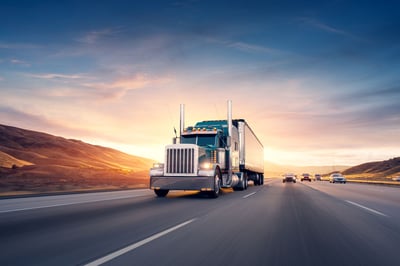6 ways smart trailers are changing the trucking industry
What is a smart trailer?
Smart trailers are any type of trailer, from flatbed to reefer, integrated with technology providing insight into the status of the truck and its cargo.
Sensors on the trailer measure features, such as:
- The location of the trailer
- Status of the trailer, including: mileage, tire pressure, reefer condition, and battery levels
- Status of the trailer’s interior, providing insight on the condition of the freight: box temperature, humidity, shock, and vibration.
Some smart trailers push real-time data to fleet managers via a platform or the cloud, while others report data at regular intervals, or store it in logs to be accessed later.
How have smart trailers impacted the trucking industry? Here are six ways.
1. Know where all trailers are at all times
If capacity is tight, a carrier knowing where all their trailers are can help them leverage their fleet to its maximum potential, ensuring they have the right number of trailers for their (and their clients’) needs.
Smart routing helps truckers avoid traffic or bad weather—and it allows the fleet to better respond to last-minute requests or avoid costly partial load deliveries.
Location data can reveal when a company could redistribute trailers to other locations, plan ahead for seasonal need, or trim down on fleet size.
2. Know that the right trailer is available and ready to roll
Trailer tracking technologies can help carriers manage truck maintenance schedules and alert them to acute problems that need to be addressed. There’s nothing worse than a driver wandering a lot, looking for a trailer only to find that it’s got a flat tire.
Smart trailers can alert fleets to:
- Flat tires
- Dead batteries on trailer devices or equipment such as liftgates
- How much charge batteries have left, including
- Battery levels on the tracking devices themselves
3. Know the temperature inside refrigerated trailers
Proper temperature control can prevent spoiled loads and benefit the bottom line.
Plus, the FDA’s Food Safety Modernization Act requires carriers to be able to document the condition of all food products under their control from pickup to delivery. In Canada, the Safe Food for Canadians Regulations has similar requirements.
So, monitoring the product and reefer temperature is critical.
Trailer tracking technology can give carriers insights into:
- temperature inside a refrigerated trailer
- reefer performance
- how many times doors have been opened (and for how long).
4. Track trailers’ maintenance needs
The maintenance benefits of smart trailers are significant.
Many truckload carriers set maintenance schedules using a pre-determined time-based system. However, using mileage-based scheduling with data supplied by trailer tracking devices, carriers can ensure they bring their trailers in at the right time to check lights, brakes, and other systems.
If carriers can cut maintenance costs by even a few percent by being more predictive with maintenance, that has a huge impact on their bottom lines.
5. Integrate trailer tracking system with your TMS (transportation management system)
The data that a trailer tracking device and other systems gather becomes even more useful if it easily integrates with the dispatch and truck management system back in the office. It’s one thing to collect data, and another to turn that data into actionable insights.
What this means is:
- Sensor data from the trailers is integrated with
- The ERP (enterprise resource planning) application, which means that
- the TMS (transportation management system) software can connect the dots.
While the trailer device knows where the trailer is, for instance, the TMS is able to use that data and other trailer sensor data to perform automated functions.
6. Manage in-transit cargo in real-time
The capabilities of current tracking technology can provide truckers, managers, and clients with crucial trailer and load data in real-time.
- If something goes wrong with a shipment, the carrier and freight forwarder or logistics provider can react in the moment, instead of discovering the problem hours later.
- They can use ongoing updates to ensure individual shipments are on-schedule and secure.
- Aggregated data can be used for in-the-moment flexible routing and smarter resource distribution.
This leads to a more efficient supply chain all around.
Smart trailers and other real-time tracking technology enable responsive problem-solving and more consistency in the supply chain. But, they aren't a panacea. What are the challenges?
Smart trailer challenges
- While new technology is constantly being introduced, it requires capital investment and availability by the trucking industry to actually impact the supply chain. Carriers who invest in these technologies do so once the life of their current equipment expires, so transitioning to this type of equipment on a broad scale will likely happen slowly over time.
- Trailer manufacturers and maintenance techs need to be prepared with a whole new skillset. Manufacturing and maintaining trailers will now go beyond hardware like axels, bearings, and brakes—it will require expertise in devices, analytics, and networks.
- The “firehose effect" of too much information and data to analyze and make actionable. And similarly, there's a need for diagnostics to pace with advancing technologies, and be unified with diagnostic standards.
Trailer technology is advancing and improving all the time. While the shipping industry won't likely see a sudden switch to these emerging technologies, getting smart about streamlined shipping is ongoing.
With half a century of international shipping and freight experience, we are your full-service freight partner.
Contact us today to learn how we can streamline your shipping operations.
Information provided by: Freight Dept. - Cole International
Learn more about our freight services.
Explaining smart trailers. It's what we do.

